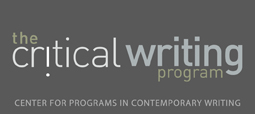Nursing
An Overview of the Discipline
Nursing is a field of work concerned with creating a positive environment for sick patients so that they can recover from or cope with their illness in the best manner possible. Traditionally, nursing has focused on only the qualitative aspect of patient care, but in the most advanced nursing programs, like Penn's, quantitative work, through scientific research, has been incorporated into the field as well. The field of nursing includes numerous sub-disciplines, including pediatric nursing and intensive-care nursing.
Writing in the Discipline
Reasoning
Because scientific articles are the most common type of writing in nursing, explanatory rhetoric is preferred in this discipline. Ideally, the evidence in scientific writing should speak for itself, however, since those involved in nursing are often vying for research grants, an element of emotional bias often enters their scientific papers.
Evidence
Both qualitative and quantitative research is acceptable and important in the field of nursing. Because nursing is a field that deals with the subjective experience of patients, qualitative research is valuable in the discipline—it can give valuable insight into patients’ feelings and conditions. At the same time, more quantitative evidence, such as statistics, is also valuable because, in a science-related field like nursing, it brings greater validity to the writing.
Authorship
Most writing in the field of nursing is collaborative. This collaboration can take many forms. Sometimes, graduate students plan papers, and doctors write them; other times, one author will perform most of the writing, and peers will edit and review; and other times still, different authors will contribute equal amounts to a single paper.
Goal
In nursing, writing is focused on defining problems and finding their solutions—authors usually do not spend time directly addressing the previous work of others. However, this is not to say that nurses ignore the work of their peers when writing; in fact, they often consider others’ papers as they perform their own studies. For example, when composing scientific research papers, nurses often study the reports of previously failed experiments. While the nurses do not explicitly criticize those failed experiments in their papers, they do so implicitly by avoiding repetition of the failed experiments’ procedures in their own work.
Claims
Because nursing is an explanatory field that is focused on problem resolution, writing in the discipline (with the exception of specialized student assignments) does not make claims about other authors’ feelings or intentions. However, since nursing revolves heavily around patient experiences, whose thoughts and emotions are central to the discipline, it is acceptable to consider their (the patients') feelings in writing for nursing. Additionally, it is not acceptable to include hypothetical situations in one’s papers when writing in the discipline of nursing.
Writing Tips
Important Criteria for Student Writing
In nursing, while there are some discrepancies about what criteria are most important in writing, there are some general guidelines as well. More general writing issues—including originality, mastery of subject matter, organization, and reasoning and evidence—are more important than the finer points of writing, such as grammar and mechanics.
Common Errors
- Procrastination during the writing process that leads to shallow, underdeveloped papers
- Incoherent sentences that impede logical flow of thought
Style
Students should match their style to that of the journal they have selected to receive their work. This incorporates a wide range of styles, from conversational to technical with lots of jargon. To discern which style should be used, students should read other articles from their journal with a special eye for audience. The readership of any particular journal ranges from clinical nurses to nurse managers to nurse scientists, each a slightly different subdiscipline with different stylistic norms. Students should learn to emulate the style of the journal to which they are sending their piece of writing.
Genres
Typical Student Writing
- Clinical shadowing experience
- Inpatient and outpatient reflection
- Case studies
- Care plans
Links to Professors' Writing
Tips from the Professors
 Professor Libonati
Professor Joseph Libonati does not have a specific handbook or style guide that he suggests for students. However, he does encourage... Read more...
Professor Libonati
Professor Joseph Libonati does not have a specific handbook or style guide that he suggests for students. However, he does encourage... Read more...

Professor Curley
Professor Martha Curley does not suggest any specific handbook or style guide to students either—all she asks of students is that ... Read more...
